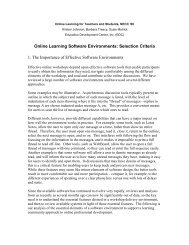It is critical to overcome the digital divide - Education Development ...
It is critical to overcome the digital divide - Education Development ...
It is critical to overcome the digital divide - Education Development ...
You also want an ePaper? Increase the reach of your titles
YUMPU automatically turns print PDFs into web optimized ePapers that Google loves.
Yong & Parrella, 2004), while o<strong>the</strong>rs have found that online courses can be d<strong>is</strong>engaging forteachers (Gabbard, Perez, & Atkins, 2002).An extensive review of research focusing on <strong>the</strong> impact of interactive media on children(not focusing exclusively on schools), looked at access, impact on cognitive development, socialdevelopment, and health and safety (Wartella et al., 2000). <strong>It</strong> found that boys use computergames more than girls, and that, as noted above girls are not computer-phobic but are <strong>critical</strong> ofcomputer content (p. 7). The study also looks at <strong>the</strong> interaction between content, activities,conditions, and goals. Wartella et. al. argue that <strong>the</strong> content of <strong>the</strong> technology <strong>is</strong> more importantthan <strong>the</strong> process, counter <strong>to</strong> o<strong>the</strong>r researchers, who argue that <strong>the</strong> process of engaging withtechnology, regardless of content, changes <strong>the</strong> learning process (J. P. Gee, 2003; Papert, 1998b).Some researchers identify <strong>the</strong> character<strong>is</strong>tics of technology that contribute <strong>to</strong> learning, includinglearning through active engagement, participation in groups, frequent interaction and feedback,connections <strong>to</strong> real-world contexts, and expanding what children learn (Roschelle, Pea, Hoadley,Gordin, & Means, 2000). All of <strong>the</strong>se highlight <strong>the</strong> importance of technological processes on“Exposing students <strong>to</strong> different styles of learning beyond F2F instruction can not onlyincrease, but also help <strong>the</strong>m feel better about <strong>the</strong>ir ability <strong>to</strong> learn. Therefore, in order <strong>to</strong>ensure equity, we need <strong>to</strong> design learning experiences that are inclusive and respectful ofgender, culture, and race.”Chr<strong>is</strong> Dede, Professor of Learning Technologies, Harvard Graduate School of <strong>Education</strong>learning, arguing that technology <strong>is</strong> more than just a different form of ‘shell’ for providingcontent.Wartella et al. found no research documenting <strong>the</strong> effects on academic achievement ofplaying computer games, though games and technology are increasingly seen <strong>to</strong> have a <strong>critical</strong>role in education (Oblinger, 2004). Researchers look at how technology can bring ‘serious play’in<strong>to</strong> formal learning (Rieber, Smith, & Noah, 1998). Youth will spontaneously spend more than14
















